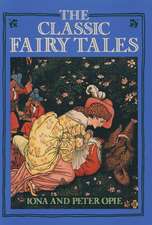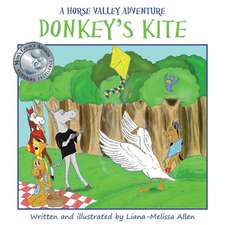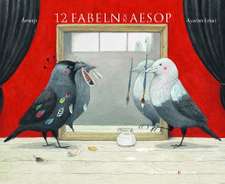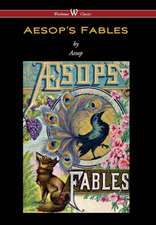Aesop's Fables: First ELI readers
Autor Aesopen Limba Engleză Paperback – 27 oct 2023
| Toate formatele și edițiile | Preț | Express |
|---|---|---|
| Paperback (14) | 43.86 lei 3-5 săpt. | +9.34 lei 7-13 zile |
| e-artnow – 14 dec 2020 | 43.86 lei 3-5 săpt. | +9.34 lei 7-13 zile |
| Prakash Books – 11 ian 2019 | 45.13 lei 3-5 săpt. | |
| OUP OXFORD – 17 apr 2008 | 49.40 lei 10-16 zile | +19.77 lei 7-13 zile |
| Penguin Books – 6 feb 2025 | 50.87 lei 3-5 săpt. | +7.58 lei 7-13 zile |
| North Parade Publishing – 25 noi 2022 | 52.68 lei 3-5 săpt. | +13.91 lei 7-13 zile |
| West Margin Press – 22 apr 2020 | 54.79 lei 3-5 săpt. | |
| UNION SQUARE & CO – 12 sep 2023 | 55.14 lei 3-5 săpt. | +17.61 lei 7-13 zile |
| Klett Sprachen GmbH – 27 oct 2023 | 78.99 lei 17-23 zile | +7.33 lei 7-13 zile |
| Lector House – 20 mai 2019 | 65.60 lei 6-8 săpt. | |
| Lector House – 21 iun 2019 | 81.24 lei 6-8 săpt. | |
| Lector House – 20 mai 2019 | 89.51 lei 6-8 săpt. | |
| Lector House – 21 iun 2019 | 111.76 lei 6-8 săpt. | |
| Prabhat Prakashan – 24 iun 2017 | 163.34 lei 6-8 săpt. | |
| LIGHTNING SOURCE INC – 24 oct 2018 | 200.59 lei 17-23 zile | |
| Hardback (8) | 36.63 lei 3-5 săpt. | |
| Applesauce Press – 10 sep 2019 | 36.63 lei 3-5 săpt. | |
| Quarto Publishing Group USA, Inc. – 11 oct 2022 | 55.20 lei 3-5 săpt. | |
| Mint Editions – 12 apr 2021 | 79.35 lei 3-5 săpt. | |
| UNION SQUARE & CO – 29 oct 2024 | 104.42 lei 3-5 săpt. | +25.23 lei 7-13 zile |
| UNION SQUARE & CO – aug 2017 | 118.83 lei 3-5 săpt. | +32.74 lei 7-13 zile |
| Hachette Book Group – oct 2024 | 120.79 lei 3-5 săpt. | +70.71 lei 7-13 zile |
| Suzeteo Enterprises – 16 mai 2018 | 145.47 lei 6-8 săpt. | |
| Alicia Editions – 4 iun 2020 | 154.40 lei 6-8 săpt. |
Preț: 78.99 lei
Nou
Puncte Express: 118
Preț estimativ în valută:
15.11€ • 15.81$ • 12.56£
15.11€ • 15.81$ • 12.56£
Carte disponibilă
Livrare economică 08-14 martie
Livrare express 26 februarie-04 martie pentru 17.32 lei
Preluare comenzi: 021 569.72.76
Specificații
ISBN-13: 9783125146464
ISBN-10: 3125146461
Pagini: 32
Dimensiuni: 171 x 242 x 7 mm
Greutate: 0.09 kg
Editura: Klett Sprachen GmbH
Seria First ELI readers
ISBN-10: 3125146461
Pagini: 32
Dimensiuni: 171 x 242 x 7 mm
Greutate: 0.09 kg
Editura: Klett Sprachen GmbH
Seria First ELI readers
Descriere
Descriere de la o altă ediție sau format:
'The story goes that a sow who had delivered a whole litter of piglets loudly accosted a lioness. "How many children do you breed?" asked the sow. "I breed only one", said the lioness, "but it is very well bred!"'The fables of Aesop have become one of the most enduring traditions of European culture, ever since they were first written down nearly two millennia ago. Aesop was reputedly a tongue-tied slave who miraculously received the power of speech; from his legendary storytelling came the collections of prose and verse fables scattered throughout Greek and Roman literature. First published in English by Caxton in 1484, the fables and their morals continue to charm modern readers: who does not know the story of the tortoise and the hare, or the boy who cried wolf?This new translation is the first to represent all the main fable collections in ancient Latin and Greek, arranged according to the fables' contents and themes. It includes 600 fables, many of which come from sources never before translated into English. ABOUT THE SERIES: For over 100 years Oxford World's Classics has made available the widest range of literature from around the globe. Each affordable volume reflects Oxford's commitment to scholarship, providing the most accurate text plus a wealth of other valuable features, including expert introductions by leading authorities, helpful notes to clarify the text, up-to-date bibliographies for further study, and much more.
'The story goes that a sow who had delivered a whole litter of piglets loudly accosted a lioness. "How many children do you breed?" asked the sow. "I breed only one", said the lioness, "but it is very well bred!"'The fables of Aesop have become one of the most enduring traditions of European culture, ever since they were first written down nearly two millennia ago. Aesop was reputedly a tongue-tied slave who miraculously received the power of speech; from his legendary storytelling came the collections of prose and verse fables scattered throughout Greek and Roman literature. First published in English by Caxton in 1484, the fables and their morals continue to charm modern readers: who does not know the story of the tortoise and the hare, or the boy who cried wolf?This new translation is the first to represent all the main fable collections in ancient Latin and Greek, arranged according to the fables' contents and themes. It includes 600 fables, many of which come from sources never before translated into English. ABOUT THE SERIES: For over 100 years Oxford World's Classics has made available the widest range of literature from around the globe. Each affordable volume reflects Oxford's commitment to scholarship, providing the most accurate text plus a wealth of other valuable features, including expert introductions by leading authorities, helpful notes to clarify the text, up-to-date bibliographies for further study, and much more.
Recenzii
'Laura Gibbs has recently brought out a splendid translation with a very helpful introduction of the bulk of the fables in the Oxford World's Classics.'
Notă biografică
Aesop, or Æsop (from the Greek ¿¿¿¿¿¿¿ Aisopos), known only for his fables, was by tradition a slave of African descent who lived from about 620 to 560 bc in Ancient Greece. Aesop's Fables are still taught as moral lessons and used as subjects for various entertainments, especially children's plays and cartoons. Aesop wrote thousands of fables, his most famous fable is "The Lion and the Mouse."
Nothing was known about Aesop from credible records. The tradition was that he was at one point freed from slavery and that he eventually died at the hands of Delphians. In fact, the obscurity shrouding his life has led some scholars to deny his existence altogether.
His most famous fable in America is a parable of "The Tortoise and the Hare." In this story, a rabbit challenges a tortoise to a race. The rabbit is sure of its victory and as a result, depending on the version of the story, in some way completes the race slower than the turtle. Often, the hare takes a nap or takes too many breaks. The persistent tortoise, despite being slower, wins because it persevered.



















